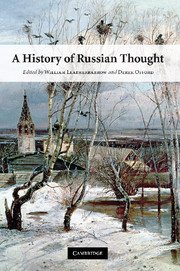Book contents
- Frontmatter
- Contents
- Preface
- List of contributors
- Dates, transliteration and other conventions
- Dates of reigns
- Russian titles of journals, newspapers and miscellanies
- PART I CONTEXT
- PART II INTELLECTUAL CURRENTS
- 4 Russia's eighteenth-century Enlightenment
- 5 Conservatism in the age of Alexander I and Nicholas I
- 6 Nihilism
- 7 Tradition and counter-tradition: the radical intelligentsia and classical Russian literature
- 8 Religious renaissance in the Silver Age
- PART III THEMES AND CONSTRUCTS
- PART IV THE AFTERLIFE OF CLASSICAL THOUGHT
- Biographical details of thinkers and writers
- Selected bibliography
- Index
5 - Conservatism in the age of Alexander I and Nicholas I
Published online by Cambridge University Press: 05 June 2012
- Frontmatter
- Contents
- Preface
- List of contributors
- Dates, transliteration and other conventions
- Dates of reigns
- Russian titles of journals, newspapers and miscellanies
- PART I CONTEXT
- PART II INTELLECTUAL CURRENTS
- 4 Russia's eighteenth-century Enlightenment
- 5 Conservatism in the age of Alexander I and Nicholas I
- 6 Nihilism
- 7 Tradition and counter-tradition: the radical intelligentsia and classical Russian literature
- 8 Religious renaissance in the Silver Age
- PART III THEMES AND CONSTRUCTS
- PART IV THE AFTERLIFE OF CLASSICAL THOUGHT
- Biographical details of thinkers and writers
- Selected bibliography
- Index
Summary
In addressing the question of conservatism in Russia and in seeking to establish the nature of any Russian conservative ‘tradition’, the initial problem, as ever, is one of defining terms. Was ‘conservatism’ in nineteenth-century Russia simply, as its opponents might have argued, the expression of unwillingness on the part of those representing a historically privileged class to accommodate any changes that might diminish that class's advantages (especially those offered by land ownership and the institution of serfdom)? Was it hostility to any manifestation of political liberalism or radicalism that might unleash destructive social consequences, a sort of reversion to the safety of tradition in order to head off the spread of revolution in the wake of 1789 or the Decembrist Revolt of 1825? Was it inevitably associated with the tradition of autocracy, or was it – as Richard Pipes asserts – more broadly based? Indeed, was it merely an inherited and unquestioning sense of the inviolability of what Shcherbatov, that eighteenth-century apologist of the old nobility, termed ‘strict ancestral rules’?
Or was Russian conservatism an altogether more positive phenomenon, securely grounded in a set of principles that were in turn rooted in the conviction that continuity was more important than change, that cultural and historical differences peculiar to individual nations were significant, and that only those circumstances and institutions validated by native tradition were truly justified and appropriate to Russia?
- Type
- Chapter
- Information
- A History of Russian Thought , pp. 95 - 115Publisher: Cambridge University PressPrint publication year: 2010
- 1
- Cited by



